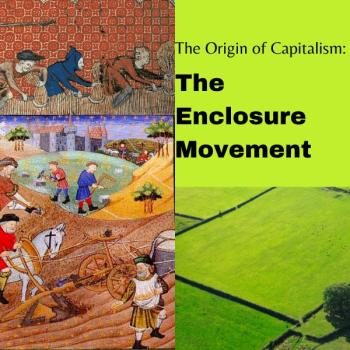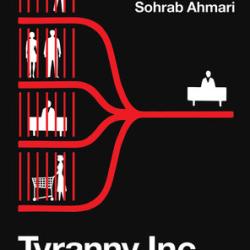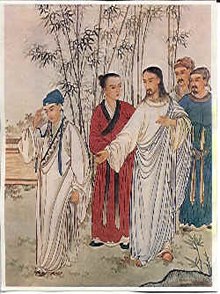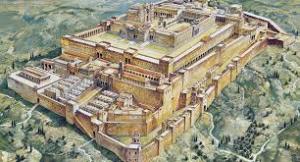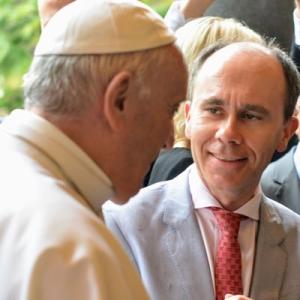
Virtue and economics go together in the work of Anthony Annett. In an age that hasn’t gotten past the neoliberal economics and skyrocketing inequality of recent years, that’s a radical thought. Annett recently published Cathonomics: How Catholic Tradition Can Create a More Just Economy. The book is the fruit of his Catholic faith, studies in philosophy, and work in the field of economics. It will be the impetus for future posts.
Annett refers throughout the book to Catholic teaching, but, he says, in an America Magazine quote:
You don’t need to be a Catholic or you don’t need to really be religious at all to [appreciate] principles like the universal destination of goods or the preferential option for the poor or the common good or integral human development.
Annett also says in an article he wrote for Commonweal:
Something has gone awry over the past four decades. Despite record-setting global prosperity, the common good is threatened by ever more extreme economic and social dysfunctions.
Anthony Annett in a world of neo-liberal economies
Anthony Annett’s experience suits him to write about the currently dominant economic system. He studied economics at Trinity College, Dublin, and at Columbia University, New York. As an economist Annett has held positions of worldwide significance. The Dominican School of Philosophy and Theology at Graduate Theological Union, Berkeley, California lists the following:
- 1998-2009, International Monetary Fund, Senior Economist,
- 2009-2014, Speechwriter for IMF Managing Directors Dominique Strauss-Kahn and Christine Lagarde,
- 2016 Adjunct professor at Columbia University School of International and Public Affairs,
- Currently, Climate Change and Sustainable Development Advisor, Columbia University’s Earth Institute. Annett led the institute’s project to “strengthen the engagement of the world’s religious communities in the climate change and sustainable development agenda.” (Sustainable Development Goals Academy web page on Anthony Annett)
- He is a member of the Leadership Council of United Nation’s Sustainable Development Solutions Network.
- Annett Periodically lectures at the Dominican School of Philosophy and Theology.
Anthony Annett introduces himself on a Dominican School of Philosophy and Theology YouTube video, “Meet DSPT Fellow, Anthony Annett.” Here he says he has always been interested in Catholic teaching on social justice. About the 2007-8 financial meltdown, he says:
It really dawned on me that this crisis was not just a financial crisis. It was an ethical crisis. That led to a lot of soul searching.
Annett’s work for international institutions began in the aftermath of that awakening. He also started in-depth study of Catholic social teaching and moral philosophers like Aristotle and Aquinas. In partnership with the Vatican, he helped form Ethics in Action, dealing with ethics, economics and sustainable development. The ethical perspective in economics, he says in the video, is “really all too lacking.”
Annett, a convert to Catholicism, has been director of a Catholic Charities program for homeless men and a volunteer prison chaplain.
Economic Neoliberalism
The 1980 election of Ronald Reagan marks a monumental shift in the American economy. Reagan took the economic theory of neoliberalism out of the halls of educational institutions like the University of Chicago and put it into practice. Taxes came down and became less progressive. Government regulations came off. Corporations found new freedoms to operate in their own best interests and the interests of stockholders. Those freedoms eventually included, on the theory that a business is a person, the right to spend practically unlimited amounts of money to influence elections and elected officials.
In neoliberalism Government no longer was thought to solve economic problems. In Reagan’s words Government was the problem. People should be free to make their own choices concerning their money without government interference. Economists touted the “invisible hand of the market.” Buyers and sellers, whether of merchandise, services, or workers’ labor, would make their own economic choices in their own self-interest. The market, through the impersonal laws of supply and demand, would steer all those individual decisions toward the common good. It was a faith that amounted to a kind of idolatry.
The result in the American economy only apparently validated the magical thinking. Growth followed the implementation of neoliberal theory. But the economic pie had been growing before that point. Annett shows that the era preceding neoliberalism, from the 1930’s to the 1970’s, actually grew faster. (p. 117) Most importantly, economic growth between the Great Depression years and 1980 favored the lower half of the economic scale. The wealth gap between rich and poor was getting smaller. And government programs like the GI Bill and housing support along with high taxes on the rich—with no tax revolt that I noticed—helped make that happen. In the years since 1980 growth has skewed in the opposite direction.
Virtue in economics, Catholic style
Anthony Annett wrote Cathonomics with a view toward bringing into economics, or in some ways restoring what once was there, a sense of virtue. Neoliberal economists like Milton Friedman had argued against any directing of economic activity toward moral purposes. In contrast, Annett begins his analysis explicitly from two great moral teachers of the past, Aristotle and Thomas Aquinas. Growing out of these and adding to them is the Catholic social justice teaching that started with Pope Leo XIII. The pope was responding to the upheavals in society and the suffering of the poor during the Industrial Revolution. Annett finds in this long social justice tradition a valuable prescription for a hopeful future path for American and world economies.
I have written about the influence of two rival but complementary strands, progressive and centrist, of Catholic thought on economics in the last century. (See a series of posts on James Chappel’s Catholic Modern.) Catholic thinkers and politicians led the way in the rise of Christian Democratic politics and economics in Europe. In the U.S. Msgr. John A. Ryan was a major intellectual influence on Franklin D. Roosevelt’s New Deal. Annett calls the period from the Great Depression to about the 1970’s the “social democratic moment.” (p. 112)
The moral agenda for a different age now includes environmental issues, globalization, and bringing marginalized groups into processes of decision making. Still, even with new a new world-wide agenda, Annett sees value for economic matters in the for-a-time discarded wisdom of the Catholic Church. Future posts will explore Anthony Annett’s thought in more detail.
Praise for Cathonomics: How Catholic Tradition Can Create a More Just Economy
Christine Lagarde, president of the European Central Bank:
Economic policy can only be effective if it is built on the strong foundations of a shared value system. Cathonomics provides an excellent account of how Catholic social teaching can help inform sustainable development and robust policies. This book should be read widely by policymakers of all stripes.
Cardinal Michael Czerny, SJ:
How does Pope Francis see the future of humanity? Here is the rich answer, expansive and well-developed, of a thoughtful economist inspired by Catholic Social Thought.
Richard L. Trumka, president of the AFL-CIO, 2009-21:
In Cathonomics, former IMF economist Anthony Annett explains how the Catholic economic and social justice traditions championed by Pope Francis offer a fundamental alternative to neoliberalism. Annett lifts up what working people have always known—that good individual lives are built on connections with other people, and that good and stable human societies are founded on solidarity, not on greed. Anyone looking for a humane pathway out of the current global crisis of neoliberalism should read this book.



